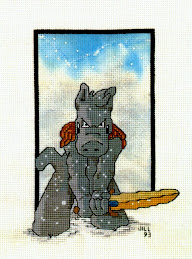When I initially saw that this was another Mind Games chapter I was hoping I’d get to see some more of Suenteus Po. I like the vague infuriating mystic and I’ve always enjoyed his amusing and rambling conversations with Cerebus. I believe Po featured in all 3 of the previous Mind Games chapters, so I was a little disappointed to see that he was not in this one.
Cerebus isn’t actually unconscious this time, so the story deviates between what he is currently doing (mostly drinking) and the conversation he’s having with himself.
The aardvark has become intensely frustrated with his sham of a marriage to a woman he doesn’t like, his overbearing monster-in-law, playing at being Prime Minister while actually doing nothing and the feeling that he is a pawn in some master game of a crazy man in Weisshaupt.
He seeks solace, as he always done, in alcohol. A good bit of the chapter reads like an alcoholic going through the various stages in their own mind when they go on a bender. If it wasn’t obvious before, this chapter points out quite clearly that Cerebus is an alcoholic. Only his iron constitution has prevented it from taking a higher toll on his body and mind prior to this. Dave had confessed prior to this to some decent all nighters and I wondered if he too hadn’t had battles with the bottle, and was drawing from personal experience. The original Mind Games came from an LSD trip.
The chapter ends with Cerebus receiving the news that he has been chosen by Bishop Powers as his preferred Eastern Pontiff and believing that he only thought he heard that because he was so drunk. It’s also the final chapter in the 2nd book of this volume of Church & State. It is to be hoped that the 3rd part is not full of short, pointless chapters that give the readers small, but unnecessary windows into Iestan society and do not advance the story.
The artwork was interesting in that Dave seemed to playing one of his artistic puzzle games by using bits of the title as the background throughout the length of the chapter. It’s quite clever and I can only guess at how he does it and still keeps the story straight and comes in at the right length.
I Bid You All Adieu
6 years ago



